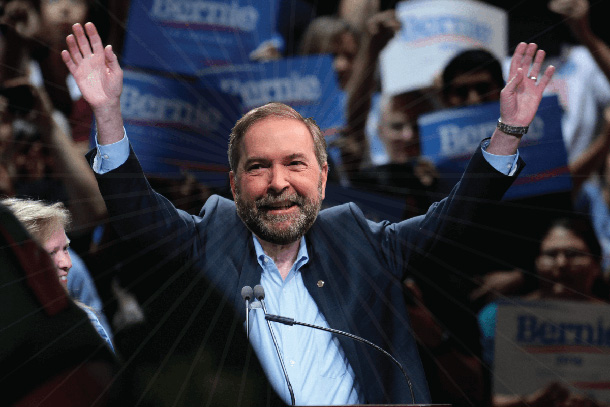It's not a great time to be Tom Mulcair. He led his party from first place to a distant third in the recent federal election, losing 51 of 95 seats that the New Democrats held going into the election. Only 10 per cent of Canadians think he'd be a good prime minister. And he will need the support of at least 70 per cent of party delegates at an April convention to keep his job, according to the NDP's president.
It's clear that Mulcair wants to keep his job. What's not clear is why he seems to think politicking like Bernie Sanders is going to get him there.
Co-opting Sanders, the outsider candidate for the Democratic presidential nomination, shouldn't be a stretch for an NDP leader. This is a party steeped in the same wealth-redistributing, regulation-imposing tea that Sanders drinks every morning. The NDP is the reason Canada has the single-payer health care system of the Vermont senator's dreams. And though Sanders' political revolution is attracting record donations and Obama 2008-era crowds, he seems like socialism-lite compared to Canadian lefty stalwarts like Tommy Douglas and Jack Layton. The NDP should be showing Sanders how it's done, and not the other way around.
But let's get one thing straight: Thomas Mulcair is not Bernie Sanders. And there's almost nothing in his political history that makes it seem like he'd ever want to be.
Sanders nurtured his socialist roots on the streets during the civil rights movement. Mulcair started his political career with the Quebec Liberal party. In 2012, Mulcair ran the most centrist campaign of the NDP leadership candidates. As leader of the official Opposition, he oversaw the NDP's slow slide towards the centre, pushing the socialist caucus off the 2013 convention floor, personally calling for the removal of the word "socialism" from their constitution, and silencing members who criticized Israel's treatment of Palestine. By the time the election rolled around, it was relatively easy for Trudeau's Liberals to outflank Mulcair's NDP on the left. It was a space the NDP had long abandoned.
Socialist awakening!
Mulcair's political reinvention started about the same time that Sanders' star began to rise. On Jan. 20, he met with party strategists at a retreat in Montebello, Quebec, to lay out his post-election plan. It all hinges, to use his words, on a social democratic vision in which the NDP, "as social democrats... will continue to fight inequality wherever it exists." Since then Mulcair has name-checked Sanders in question period, and started raising his key issue -- income inequality -- at every possible opportunity.
In his post-election letter to party members, Mulcair mentions "social democratic values" or "social democrats" along with "income inequality" three times each in just 995 words. In contrast, the 81-page platform his party campaigned on just four months ago mentions the phrases "social democrat" or "income inequality" exactly zero times. It's quite the turn for a man who told Peter Mansbridge last September that his most electable quality was "a clear plan, consistency" and that "you can't run a country by focus group. You can't keep changing your position."
To be fair, it is absolutely possible that Mulcair had a socialist awakening in the past few months. But given his lifetime of pragmatic centrism, that seems about as likely as Ted Cruz asking for a reinstatement of his Canadian citizenship. What seems more plausible is that Mulcair does not want to see his political career end with electoral failure, and that he's willing to do and say whatever it takes to prevent that from happening.
For me, watching Mulcair dress up his politics like Sanders' triggers the same second-hand embarrassment I get from seeing photos of myself in Grade 8 with permed hair and blue eye shadow. I was desperate to fit in and pretended to be someone I wasn't. Not surprisingly, it didn't work.
For Mulcair, it might. The NDP does not have a habit of throwing out its leaders after election losses, and there are many in the party saying they'll give him a second chance. If they're correct and Mulcair gets the mandate he and his team need to stay on, he'll have four long years in the political wilderness to convince them -- and Canadian voters -- that he's not just saying what he thinks they want to hear. ![]()
Read more: Federal Politics
















Tyee Commenting Guidelines
Comments that violate guidelines risk being deleted, and violations may result in a temporary or permanent user ban. Maintain the spirit of good conversation to stay in the discussion.
*Please note The Tyee is not a forum for spreading misinformation about COVID-19, denying its existence or minimizing its risk to public health.
Do:
Do not: